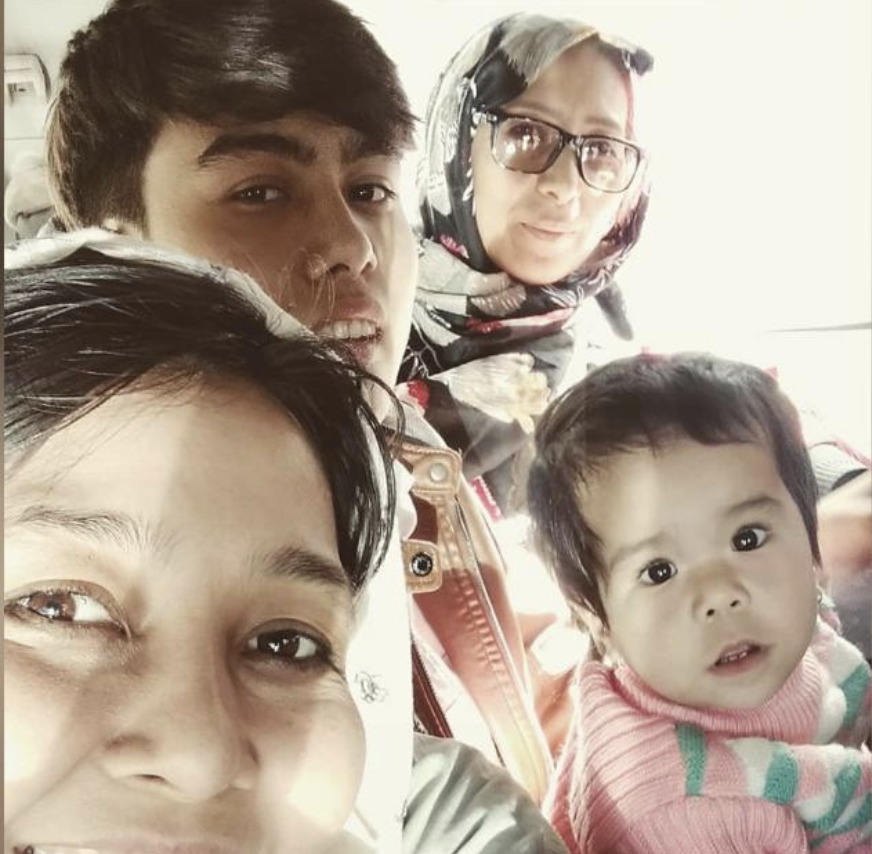By Josh Campbell and Meridith Edwards
– Updated 12:00 AM EDT, Mon March 28, 2022
When Russian forces first rolled across the border into Ukraine last month, Sayed and Masuma Hosseini were calm.
The former Afghan soldier and his wife, who had been living in Kyiv with two of their children since late 2021, had seen more wars than most will in a lifetime.
Forced to flee their homeland three separate times before due to conflict, they had received an unwelcome education in the complex nature of violence, and a sharpened sense of perceived versus real danger.
But the Hosseinis would soon find themselves refugees for yet a fourth time, rapidly packing only what they could carry, and setting off in what they prayed was the opposite direction of flying bombs and bullets.
‘Things will calm down’
At first, the Hosseinis expected Russia’s invasion to be brief — no more than a couple days.
“Either it will go to this side or that side,” said Masuma, describing her initial thinking. “Either Putin will take (the country) or Zelensky will take it. These two will reconcile among themselves and things will calm down.”
Rather than reconciliation, what followed was a brutal, if lumbering, advance by Vladimir Putin’s forces. In seeking to capture key Ukrainian cities, Russian troops shelled neighborhoods, killing countless innocent civilians in attacks the United States and its allies have described as war crimes.
Apart from the periodic air raid or police siren, Masuma said the city of Kyiv was relatively quiet at the start of the war.
Unable to speak Ukrainian, the family took its cues from locals living in their small apartment building. The sound of a toddler in the unit above, who would often run across the apartment, was a comforting noise. As long as the Hosseinis heard the riotous child through their ceiling, they knew their neighbors had not yet begun heading for the underground shelters.
But soon came the explosions, the fear, and a plea from their daughter in the United States to immediately leave the capital.
‘We felt like there was no hope’
This was not the first time the Hosseinis had found themselves fleeing Russian aggression.
In 1979, the Soviet military invaded Afghanistan in a war that lasted a decade. The campaign would ultimately result in nearly a million Afghan deaths and the loss of 15,000 Russian troops.
As Soviet forces besieged their country, Sayed and Musama fled to nearby Iran.
“When it became calm, we returned to Afghanistan,” said Masuma. “Then, when we were there for a few years, the Taliban (came to power) for the first time and fought, and we became refugees again and went to Iran.”
They remained in Iran until US forces launched operation Enduring Freedom after the terrorist attacks of September 11, 2001. With the brutal Taliban regime toppled, the Hosseinis felt it was safe to return home, hoping to never again have to assume the title of refugee.
That hope was fleeting. Nearly 20 years after the start of the war, US President Joe Biden announced US forces would be pulling out of Afghanistan, indicating the prolonged and intractable conflict no longer aligned with American priorities.
By mid-August, the Taliban had seized control of every major city in the country and took over the presidential palace in Kabul.
As the US military finalized its chaotic withdrawal, the Hosseini family feared that Sayed’s role in the Afghan army and their daughter Fatema’s job as a journalist would put the family in the crosshairs of the Taliban.
Fatema made contact with US Navy Reserve Lieutenant Alex Cornell du Houx, who had been working in his personal capacity to help rescue Afghans trying to leave.
Cornell du Houx worked alongside a contact in the Ukrainian military to help secure approval for a special humanitarian flight mission that ultimately brought the Hosseinis to safety in Kyiv.
“There were times when we felt like there was no hope of getting our allies through the gate, then I would get a message from the Ukrainians saying they found a path and guided them to safety — including Fatema’s family,” said Cornell du Houx. “We were supporting thousands of Afghan Allies and by far the majority who made it to safety could breathe a sigh of relief due to the bravery and skill of our Ukraine friends.”
In less than six-month’s time, those same Ukrainian forces would be pleading with the world for help of their own.
‘You can survive this one, too’
Nearly 5,000 miles west of Kyiv in a neighborhood outside Washington, DC, Fatema Hosseini, now a college student, was into her second night of no sleep, repeatedly refilling her coffee mug to help stay awake as she tried to get her family out of war-torn Ukraine.
“I was trying to calm them down by saying: ‘You survived so many wars. You can survive this one, too,’” said Fatema. “But deep in my heart I was literally shivering.”
Communicating by text and video with her 18-year-old brother, Abdulfatl, she implored them to try to get to one of the trains that would take refugees from Kyiv to the western city of Lviv. But the family had little money to pay for tickets, and Abdulfatl said their mother, Masuma, was too sick to travel.
Through the kindness of strangers in their apartment building, the family gathered enough money to make the trip.
But, the train waiting to depart for Lviv was completely packed. “You have to get in,” Fatema told Masuma. “She cried. She said, ‘I can’t,” fearful her 2-year-old daughter, Mobina, would be crushed in the crowd of refugees jammed into the rail car.
Using social media to communicate with strangers in Ukraine, Fatema tried to find other methods of travel for her family, including by bus, but was told there was shooting taking place at the local stop.
While Fatema was busy trying to find a driver, Abdulfatl called and said he had managed to find space on another train bound for a different western Ukrainian city and they were on their way.
Elated and thoroughly exhausted, six time zones away from her family, Fatema passed out. When she awoke, she placed an emotional call to her younger brother, still on the train.
“You did a very great job,” she said, fighting back tears.
‘People there are beautiful’
Fatema’s next goal was to try to find her family a car for the four-hour drive from the train station to the Polish border.
Once again, using social media, she reached out to various strangers for help, including a retired US soldier who put Fatema in touch with an aid group. Volunteers sent a car for the Hosseinis, who were taken to a shelter and provided food.
Actually getting across the Polish border was the final hurdle for the thoroughly fatigued family.
When they first arrived in Kyiv from Afghanistan, the Ukrainian government had taken their passports and provided them with temporary refugee documents. The Hosseinis were told they could retrieve their passports if they ever decided to leave Kyiv for a third country, but this was before Ukraine found itself under attack. In their race to flee the besieged capital, the family couldn’t get their official documents from the immigration agency.
Their saving grace was a journalist Fatema met through online contacts, who drove the Hosseinis to the border and helped them pass through into Poland, far from the Russian invaders.
Reflecting on the many good Samaritans responsible for the safety of her family makes Fatema emotional. Most, if not all, are Ukrainians she will never get to meet and thank in person.
“I wish I could be from Ukraine,” says Fatema. “I wish that could be my homeland. People there are beautiful. They’re kind, and they don’t hesitate to approach you and help you.”
‘Do not get attached to one place’
Sayed, Masuma, Abdulfatl and little Mobina Hosseini are presently in Warsaw, staying at the home of yet another new friend Fatema made online. Their goal is now to get to Canada — a nation that has received personal praise from Ukrainian President Volodymyr Zelensky for welcoming refugees with open arms — and to live with their eldest daughter.
There is one final challenge: the expensive price of airfare. With little money and few possessions, they do not know how they will be able to make the journey.
Much like the millions of other refugees fleeing Putin’s war, the fate of the Hosseinis is unclear. They are safe, Masuma says, and she looks forward to the day the family no longer has to flee conflict, but she remains more prayerful than hopeful.
“I pray that no one, no other country, no person on the face of the earth, becomes a refugee…that all live in peace” she says.
Asked what her message is to others who may face war, Masuma is practical rather than philosophical. “When a person becomes a refugee, they miss everything,” she says. “Make a simple life for yourself. Do not buy too many clothes. Do not get attached to one place, because when you immigrate again, you will have to leave everything behind.”


No responses yet